Average Units Of Botox For Crow’s Feet
The average number of units needed for the treatment of crow’s feet is usually 10-15 units per side. It all depends on the person.
The average for most of my patients is 12.5 units per side which includes 2.5 units on each side in the lateral eyebrow areas to produce a lateral eyebrow lift. (Steven E. Rasmussen, MD, FAAD, Austin Dermatologist)
Botox Dosage for Crows Feet
Dosage for botox in the crow feet area varies from patient to patient and their treatment outcome desired, but on average I use 15 U in total for both sides. (Praven Chetty, MD, Kelowna Physician)
Botox dosing of Crow’s Feet
The amount of Botulinum toxin needed to optimize the reduction of Crow’s feet will depend on how prominent the Crow’s feet appear when the person’s face is relaxed and how much of an “eye smiler” they are.
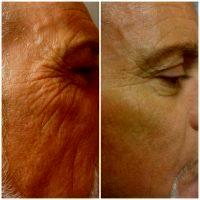
10 – 30 Units For Men
The amount varies depending upon the severity of the crows feet. I typically start out with 7.5U on each side for the average person, however I can range from 7.5 to 15U on each side. I do three injections along the crows feet.
I would start out with the lesser amount first and if you need more, I would do more injections. (Ben Behnam, MD, Santa Monica Dermatologic Surgeon)
Botox dosing
There are “average” amounts of Botox in any given area of the face, however, every practitioner will make their own decision. I personally decide dosing based on the muscle movement with expression, and how happy they have been with prior injection amounts.
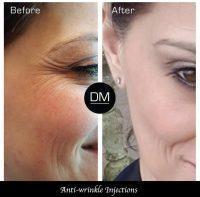
Crow’s Feet (and Laugh Lines) Are The Result Of Reduced Elasticity And Subcutaneous Tissue
Botox for Crows Feet
The amount of Botox units to the crows feet can vary patient to patient. On average we are using 7-12 units/ side. It all depends on how severe the wrinkles are.
When in question, it is fine to stay more conservative, do a lesser amount and be sure to follow-up w/ your practitioner in 10-14 days to determine if additional units are necessary. (Grant Stevens, MD, Los Angeles Plastic Surgeon)
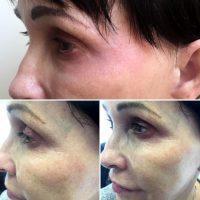
How Long Does A Botox For Crows’s Feet Treatment Take
On an average, we administer about 25 units of Botox on the crow’s feet area. It can also vary from patient to patient, depending on the severity of the wrinkles around the area. (Kenneth Bermudez, MD, San Francisco Plastic Surgeon)
22-24 units is a typical dose for the Crows Feet. (Luke J. Curtsinger, MD, Savannah Plastic Surgeon)
Choosing the right dosage
The dosage of Botox for crows feet can range from 8 to 12 units per side in most people. The dosage varies depending on the strength of the muscles. (Martin Jugenburg, MD, Toronto Plastic Surgeon)
Botox, Dysport, Wrinkle Treatment, Beverly Hills Botox Dysport, Los Angeles Botox Dysport
I have used Botox for over 20 years and my standard dose for the Crow’s Feet is between 12-20 units. (Francis R. Palmer, III, MD, Beverly Hills Facial Plastic Surgeon)
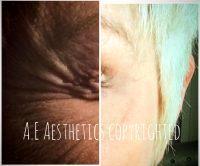
The Crow’s Feet Area Is Typically Treated With An Average Dose Of 4 – 20 Units
I usually use only about 6-7 units per side for crows feet
I usually have good results with just 6-7 units per side. Patients with more muscle mass, usually males, may need more. (Gary Hall, MD (retired), Kansas City Plastic Surgeon)
Number of Botox Units needed
Crow’s Feet are typically classed as one area, which generally would use 25-30 units, so 12-15 units split between each side. (Cory Torgerson, MD, PhD, FRCSC, Toronto Facial Plastic Surgeon)
The appropriate dose of Botox for any given region of the face is variable from one patient to the next, depending on muscle volume and strength, gender (men need larger amounts), length of time that a patient has used Botox etc.
However, for the crow’s feet, the vast majority of female patients will get a very good result with 10 – 12.5 units per side. That is my usual starting dose. For all my new Botox patients, I will have them return to the office two weeks after their first injection, when the Botox effect is at its peak, and add more units if necessary at no charge.
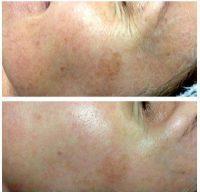
The Most Common Side Effect When Botox Is Used For Crow’s Feet Is Swollen Eyelids,
How many units of BOTOX for Crowsfeet
BOTOX injections for the crows feet are one of the most common injection sites. The skin is very thin around the eye, making fillers less than desireable. I will generally place 12.5 units on each side for a total of 25 units.
While the length of effect and efficacy is dose related using 20 units per side is a lot. (Brian Maloney, MD, FACS, Atlanta Facial Plastic Surgeon)
Units for Botox for Crow’s Feet Varies from Patient to Patient
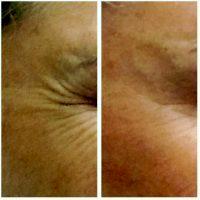
When Can I See Results Of A Botox For Crow’s Feet Treatment
If 22 to 28 units has worked in the past, there’s no reason for it not to work now. (Richard J. Bruneteau, MD, Omaha Plastic Surgeon)
Suitable Dysport and Botox doses for crow’s feet
The dosage of Botox depends on the degree of wrinkling and the history of prior eyelid surgery. For an average person in their late forties I use a range of 30 -35 units whereas on a much younger patient I may use 18-25 units.
Botox for Crows Feet
We use as little as 5 units (2.5 units per side) for young patients with early lines up to 35 – 40 units for men with large muscles around the eyes who require a lot.
On the average, we use 15 – 20 units total for both sides. (Stella Desyatnikova, MD, Seattle Facial Plastic Surgeon)
I will often start with 8-10 units per side. Sometimes patients can develop tolerance to the treatments and need higher than average dosing. (Mahsa Sohrab, MD, New Haven Oculoplastic Surgeon)
The average number of units for crows feet is 25-30 but can be more. Remember, you will always have some wrinkling of the crows feet even with botox. Too much botox in the crows feet and your cheek area can drop causing an abnormal appearance.
It is better to start off conservative, you can always add more later. (Kurtis Martin, MD, Cincinnati Plastic Surgeon)
Botox units in Crows Feet
It is important that each patient be assessed for their individual movement and treatment customized based on this assessment finding. As a general estimate or average, most patients require about 20 units of Botox total for the crows feet, 10 units around each eye. Too many units can cause a dropping effect; around or under the eyes, this can contribute to a hollow or sunken effect. (Joseph Serota, MD, Aurora Plastic Surgeon)
Every individual is different, depends on their wrinkles and the strength of their muscles. The average amount of Botox units for each side are generally 12 to 15 units. (Bruce E. Katz, MD, New York Dermatologic Surgeon)
